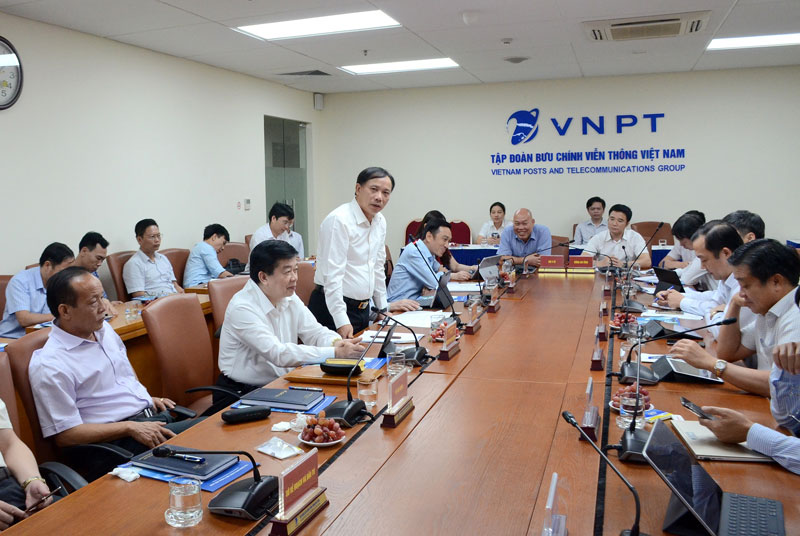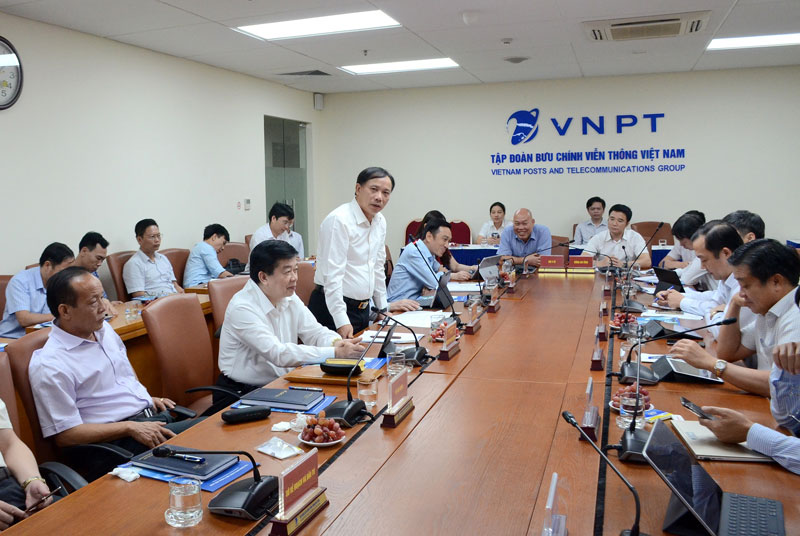
(HBO) – A delegation of the Hoa Binh provincial People’s Committee led by its Chairman Bui Van Khanh has had a meeting with leaders of the Vietnam Posts and Telecommunications Group (VNPT) to discuss future cooperation contents in developing e-Government and smart city.
 Chairman of the Hoa Binh provincial People’s
Committee Bui Van Khanh speaks at the meeting with VNPT leaders.
Chairman of the Hoa Binh provincial People’s
Committee Bui Van Khanh speaks at the meeting with VNPT leaders.
At the
meeting, a representative from VNPT-IT – a member company of VNPT – introduced Hoa
Binh delegates to the intelligent
operation centre (IOC) and Integrated Land Information System (iLIS) developed
by the VNPT. The two solutions are able to monitor and provide comprehensive data about activities of cities
and provinces, contributing to the development of e-Government and smart city.
Khanh spoke
highly of the potentials of the project, saying once implemented, it will help
strengthen connections among
authorities, businesses and people.
It is expected
to provide significant support for the local administration in decision-making
process.
He agreed in
principle with the construction of the provincial IOC, which should be started
as soon as possible to serve the building of e-Government and smart city.
The leader
assigned relevant departments and agencies to advise the provincial People’s
Committee on the project and allocate sufficient funding for the implementation
of priority contents.
They were also
tasked to study the renewal of the strategic cooperation agreement in
information and telecommunication technology (ICT) between the province and VNPT for the 2021 –
2025 period, based on the 2014 – 2020 deal.
VNPT's General
Director Pham Duc Long said he believed that on the basis of the two sides’ partnership
and enthusiastic support for each other, the IOC project will help the
provincial administration in management, fostering socio-economic development
and ensuring social order and security./.
In the spirit of "Party members go first, the people follow”, all households of Party members in the Doan Ket sub-region in Da Bac town, Da Bac district, voluntarily removed gates and fences, and donated land when the road expansion project passed through their properties. Inspired by their example, 68 households in the sub-region quickly followed suit, contributing over 1,400 sq.m of residential and perennial cropland to widen the main road through the residential area. The exemplary role of Party members in Doan Ket stands as a shining example of studying and following President Ho Chi Minh’s thought, morality, and lifestyle.
The Hoa Binh provincial People's Committee held a monthly meeting on May 29 to assess the implementation of socio-economic development tasks in the first six months of 2025, the progress of key projects, and some other important issues.
During his lifetime, President Ho Chi Minh always expressed his deep affection and special concern for children and youth. He once emphasized: "Caring for and educating children well is the responsibility of the entire Party and the entire people”; "First of all, the family (i.e. grandparents, parents, siblings) must do this job well”. "the Party Committees…, the Children’s Committee, the Youth Union, the education sector, and all related organizations must have specific plans to ensure children grow healthier and more progressive”. His teachings has been remaining valuable and serving as the guiding principles in the work of protecting, caring for, and educating children. In line with this ideology, Hoa Binh Province has continuously been prioritizing and investing resources in the well-being of children in recent years.
Mr. Nguyen Phi Long, the alternate Member of the Party Central Committee and Secretary of the Provincial Party Committee chaired the meeting of the Standing Committee of the Provincial Party Committee to provide opinions on several investment projects within the province. There was the attendance of Ms. Bui Thi Minh, the Permanent Deputy Secretary of the Provincial Party Committee and Chairwoman of the Provincial People’s Council; Mr. Bui Đuc Hinh, the Deputy Secretary of the Provincial Party Committee and Chairman of the Provincial People’s Committee and other members of the Standing Committee; the leaders from other departments, agencies, and some localities.
The Standing Board of the Vietnam Fatherland Front (VFF) Committee of Hoa Binh province held a meeting on May 28 to honour outstanding village elders, village heads, and reputable individuals from local ethnic minority and religious communities.
In mid-May, the provincial Museum organised an exhibition named "Duoi la co Dang Cong san Viet Nam quang vinh” (Under the flag of the glorious Communist Party of Vietnam). This meaningful activity took place in the joyful atmosphere to celebrate the country's major holidays and the Party congresses at all levels for the 2025-2030 term, towards the 14th National Party Congress.



 Chairman of the Hoa Binh provincial People’s
Committee Bui Van Khanh speaks at the meeting with VNPT leaders.
Chairman of the Hoa Binh provincial People’s
Committee Bui Van Khanh speaks at the meeting with VNPT leaders.